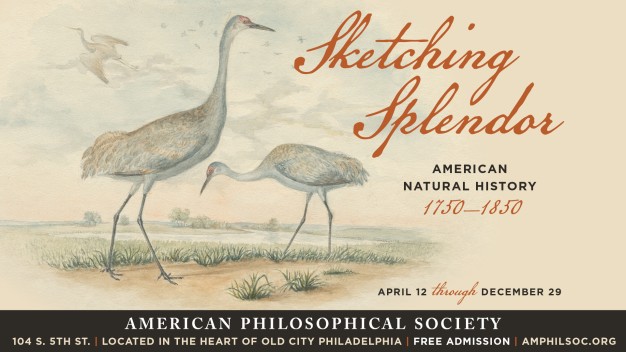Sketching Splendor Opens April 12
18th and 19th century Philadelphia was a hive of scientific discovery, inspiring artists and scientists to capture the beauty, excitement, and complexity of the natural world with words and images. Opening on Friday, April 12, 2024 at the American Philosophical Society’s Museum, Sketching Splendor: American Natural History 1750–1850, explores how three artist-naturalists—William Bartram, Titian Ramsay Peale, and John James Audubon—combined these skills to depict the flora and fauna around them in distinct ways.
Highlights of the exhibition include William Bartram’s map of the Alachua Savanna, Titian Ramsay Peale’s watercolors from the Long Expedition, and one volume of John James Audubon’s original Birds of America. A video installation titled Field Companion, 2021, by Philadelphia-based artists Nadia Hironaka and Matthew Suib will also be on view.
The drawings, prints, and watercolors on display in the exhibition are not the sole work for these men, however. The exhibition gives credit to the women, Native Americans, and enslaved people whose knowledge, craftsmanship, and labor made these discoveries possible.
The exhibition also explores the ways these artists’ notions about westward expansion and colonization, perceived social hierarchies, and a changing political landscape impacted their views on the natural world.
A conference exploring the labor involved in natural history work will bring together scholars on June 6 and 7 and will feature a keynote talk from best-selling author Jennifer Ackerman on her book What an Owl Knows.
Family-friendly programming will offer hands-on activities throughout the exhibition’s run. Groups can request private tours through the museum’s education department ([email protected]).
Admission is free and the museum will be open Thursday-Sunday 10:00 a.m. through 5:00 p.m. April 12 to December 29, 2024.
About the American Philosophical Society
The American Philosophical Society, established in 1743 by Benjamin Franklin for the purpose of “promoting useful knowledge,” is the nation’s oldest learned society. An intellectual bedrock of the early United States, the APS counts nearly all of the nation’s founders as Members of the Society. Election to Membership honors those who have made exceptionally significant contributions to science, the arts and humanities, and public life. The Society promotes scholarly research through its Library, including 40 fellowships each year, and through its research grant program. The Society sustains an informed citizenry through twice-yearly meetings and topical conferences and symposia. Public programs and museum exhibitions are inspired by the Society’s Library & Museum collections, which include 14 million pages of manuscripts, 275,000 books, and approximately 3,000 artifacts and fine art objects. The collection is strongest in early American history, Native American history and culture, and the history of science. The APS Press is the oldest continuously operating scholarly press in the country and it is dedicated to publishing research that reflects a broad range of useful knowledge.

